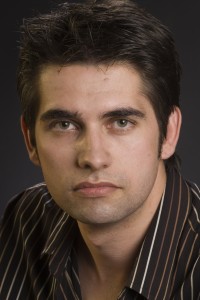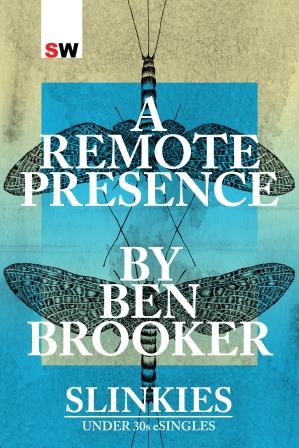
Our intrepid Slinkies editor, Laura Barry pinned down the prolific writer, editor, critic, essayist, and playwright, Ben Brooker and asked him about his writing, his influences and whether he prefers baking to cleaning the house. Here’s what he said:
LB: Do you remember the name and the personality of the first character you ever created?
BB: I consider the first ‘proper’ story I wrote to have been ‘Piano in the Darkness’. I was around the age of 12 or 13. It was this sort of gothic thing in which the nameless protagonist, a reclusive old pianist, ends up piercing himself through the heart with a shard of broken glass from a photograph of his dead wife – hilarious! I was inspired to write the story after waking up late one night to the sound of my brother Matthew playing Moonlight Sonata in his bedroom on a newly acquired piano.
LB: Do you have any unusual writing habits?
BB: In the midst of muddling through an idea that I think could be worthwhile I sometimes find myself roaming around the house. It’s quite automatic but I find there’s something about doing this that can seem to help shake loose some reticent thought or phrase or piece of dialogue.
LB: Any advice to share with other young writers?

BB: I’m not really a fan of dispensing ‘tips’ to other writers. Writing is much too personal, and anyway writers already know what they have to do: read and write as often as possible. What’s harder to know is how to keep motivated and enthused, to retain the sense that what you’re doing matters. I find it helps to try to think about rejections differently, as opportunities – to improve your work or to try it out on some other editor or publication you admire – rather than judgments on your abilities.
LB: How do you approach a new story? With a clear plan of the narrative, or is it more of a ‘well, let’s see how this goes’, sort of approach?
BB: Every story demands to be written in its own way, but generally speaking I don’t do very much advance planning. My writing usually emerges from an idea, something fairly abstract, rather than a plot. I want to get inside that idea and see what it looks like from within rather than spend too much time poring over its outward shape.
LB: Are you a procrastinator? A keen procrastibaker? An avid procrasticleaner?
BB: The Internet is for me the biggest enabler of procrastination, if only because I don’t even have to leave my desk to use it! I try to keep to regular hours (nine to five) when writing so am usually able to hold over the cleaning and cooking (not baking, which I loathe) until the evening, aided by a glass of wine.
LB: ‘Kill your darlings’ – easier said than done?
BB: Yes! It helps to have a good editor who is capable of letting you down gently. I sometimes think, though, that this expression is not all that helpful. I tend to put my darlings to one side rather than kill them – it may be that they just haven’t found their rightful place yet.
LB: Is there one particular author or book that you look to as a source of inspiration for your own writing?
BB: It can be unwise to immerse yourself too much in another author’s writing when working on something – too many voices in your head at once can make for a conversation and I don’t think that’s a great place for writers to be working out of. Having said that, I will sometimes reach for a favourite author or piece of writing if I’m at a low ebb. I suspect this has less to do with looking for inspiration than some misguided belief in the osmotic properties of genius.
LB: Any advice for those stuck in a reading or writing slump?
BB: I find it helps to have multiple (and divergent) books/projects in train. I read and write across a few different genres and there’s no doubt being able to switch between, say, writing an essay and a short story, or reading a novel and an autobiography, can do much to refresh and re-energise the mind.
LB: What are you reading at the moment? Any recommendations?
BB: Eric Schlosser’s Command and Control, Margaret Atwood’s Stone Mattress, Geoffrey Robertson’s An Inconvenient Genocide, and I’m working my way through the plays of Camus. All recommended!
Ben Brooker is a writer, editor, critic, essayist, and playwright. He is the author of many published short stories, poems, essays and reviews and has written for Overland, New Matilda, New Internationalist, Australian Book Review, the Daily Review, and his blog Marginalia. He lives in Adelaide where he is working on a collection of short stories on the theme of utopia.
Ben’s story, ‘Awake’ is published in The World To Come which you can purchase here as a paperback or ebook. And his Slinkies eSingle, A Remote Presence, is available here.
[purchase_link id=”4653″ style=”button” color=”” text=”Purchase” direct=”true”]
Follow Us:
Share this page:
